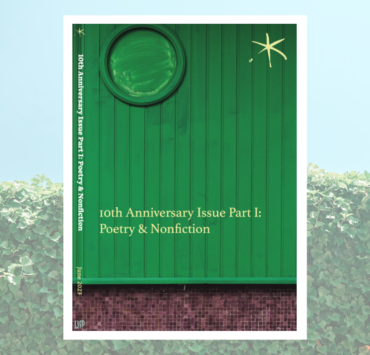
Translated from the original by Noah T. Myers
After the divorce, I decided to move as far as I could from that bustling city, so full of him. I closed my eyes, pointed to a random spot on the map, and with my meager savings and everything I could stuff in the trunk, I hit the road.
I spent the first few days in a motel. Once I found a job waiting tables, I rented a room in the house of Mrs. Paula. The place wasn’t big, but I didn’t need much; what mattered to me was that I could relax and be alone.
Mrs. Paula had a son in his early twenties. He was tall with brown skin and a round, pleasant face, like a tomato from a TV ad. His name was Isidro, but for some odd reason, his mother called him Isidoro of Guatemala. When I asked Isidro the reason why, he responded, “at this point, not even she knows.” It turned out that Mrs. Paula suffers from Alzheimer’s, but by the time I found out it was too late: I had already gained an affection for her son and for my new flower, Dalila.
Cuscuta prunus is the scientific name of my dear Dalila, the name Isidro gave her. She is a mix of a parasitic flower and a vine that grows out of rocky outcrops, or, in the case of Dalila, out of the wall of my room. She is a radiant pink, almost fuchsia tone with long yellow stamens that she uses to move around and to show affection. Her stem is long, fine and so flexible it seems to be made of rubber, which is what gives her such ease of movement.
Isidro, who is a writer, says she’s an extremely exotic specimen, “one in a million.” He was the one who stopped me from hysterically ripping her out of the wall when I first discovered her, newly sprouted, winding around herself like a shiny little spider. He immediately named her and explained all the things I should know about her and how fortunate I was to have her. Little by little, I became attached to her— how could I not, really? She’s so smart and sweet-natured. When I get home, no matter how late, her shining yellow stamens greet me with joy, waiting to be caressed. She climbs up into the crack between the rustic wall and the ceiling and waits, bubbly and glowing, for me to open the door and turn on the light, and then jumps onto my face, running through my hair and neck like scurrying ants. Isidro says she may be drawn to the smell of food that lingers on me. Later, I shower and get into bed, and when I turn off the light she curls up like spaghetti on a fork and goes to sleep.
This had been our routine for several months, but yesterday, when I got home, I found her in a nervous, frightened state. She wasn’t waiting for me. This caught me off guard and I immediately became concerned. When I came into the bedroom and turned on the light, I found her winding around herself like a madwoman, like a clock with a hand trying to detach itself. Then she jumped toward me and her trembling tentacles first got tangled in my hair and then clasped tightly around my neck.
As late as it was, Isidro was still awake. Writing, he said. After helping to free my head from Dalila’s grip, he explained what had transpired:
“Mom had a really long, intense attack. I had to give her a shot and take her to the doctor.”
He told me that for a long period of time Mrs. Paula had not recognized him and because of that she had panicked and began throwing everything she could find at poor Isidro: plates, cups, pots, knives. Despondent and with his eyes clouding up, he showed me a bandage on his arm where the blade of one of the knives had reached him.
Now I understood why Dalila had been so afraid; poor thing, she wasn’t born to deal with this kind of upheaval.
I spent another while talking with Isidro and then he went to finish the story he had been working on, something about a person who turns into a cockroach, or a cockroach that thought it was a person; I wasn’t really sure.
Once I was in bed and sensing that Dalila had calmed down, I turned out the light and reflected on what had happened. It wasn’t right to keep exposing Dalila to this type of convulsions; that would be inhumane. Mrs. Paula’s disease was incurable and now she would have to be cared for by a nurse every day, according to Isidro. In other words, there would be no more privacy in the house. The solution would be for me to move. I had already saved up enough money to get an apartment, but one thing Isidro had told me was to never try to transplant Dalila; that would kill her. I had even considered cutting out a chunk of the wall so I could take her with me to a new home.
It was a rough, drowsy night. Now and then I would drift off, only to awaken, startled, with the sensation of an army of ants sucking at my veins. At times, I thought it was Dalila, but when I turned on the light I would find her wound up like a centipede, with a Mimosa pudica’s mournful look about her. I would turn out the light and within moments have the same feeling: tiny tentacles sucking on my pores, coiling into my hair, kissing my belly. I would wake up shaking and soaked in sweat. I might have spent the whole night this way, awakening with a start every few minutes, if, on one of the occasions that I turned on the light to check on Dalila, I hadn’t glanced over at my arm reaching toward the lamp and found little pink blotches, like bites. I leaped out of bed and found, to my horror, my face, neck and stomach also covered.
I looked back at Dalila, confused by her inertia and my condition. I pulled the bed away from the wall and was instantly left breathless at what I found living there. Dozens of tiny Dalilas had sprouted, and these had multiplied and spread all around the bed and the corners between the floor and the wall. At the sight of me, they stretched out their vines and scuttled— some toward the bed, others up the wall, toward Dalila, who lay petrified; and still others came toward me. At that moment I knew there was no escape.
Spanish version previously published in El tragaluz del sótano, Cuentos. Artepoética Press.

Kianny N. Antigua is a Senior Lecturer of Spanish at Dartmouth College, and an independent translator and adapter for Pepsqually VO Sound & Design, Inc. Antigua has published twenty-four books of children’s literature (seven by commission), five of short stories, two collections of poems, an anthology in two languages, a book of microfiction, and a novel. She has won sixteen literary awards and many of her texts have been included in anthologies, literary journals, newspapers and textbooks. Some have been translated into English, French and Italian. She is the translator (Eng./Spa.) and the audiobook narrator of Dominicana (Seven Stories Press, 2021), by Angie Cruz; translator of the children's novel Lucky Broken Girl, by Ruth Behar; the YA novel Never Look Back (Bloomsbury/Audible, 2022), by Lilliam Rivera; and the picture book Plantains Go with Everything (HarperCollins, 2023), by Lissette J. Norman.







